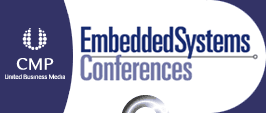| |
Previous RTAS:
2001
2002
2003
2004
2005
RTSS
WPDRTS
ECRTS
the IEEE TC on RTS

since Dec 2004
This site is sponsored by the
Computer Science Department at the
University of Pittsburgh.
Send your comments and questions to
mosse@cs.pitt.edu
| |
|


|
RTAS 2006
12th IEEE Real-Time and Embedded Technology and Applications Symposium
April 4 - April 7, 2006
San Jose, California
,
United States
Submissions Closed
|

|
|
|
|
Featuring: expanded focus on embedded systems and industrial applications, multiple tracks,
and new topics in hardware-software co-design! (See CFP)
|
Related Conferences
|
| |
RTAS 2006 seeks papers describing significant contributions both to state of
the art and state of the practice in the broad field of embedded and open real-time
systems and computing.In order to maintain a close connection to the practice of
embedded and real-time computing,RTAS 2006 is co-located with the Embedded Systems
Conference, the leading conference and trade show in the embedded systems industry.
The scope of RTAS 2006 consists of the traditional core area of real-time and embedded
systems infrastructure and theory, as well as three additional areas of special emphasis:
embedded applications; development, verification, and debug tools for real-time and embedded systems;
and embedded systems hardware/software co-design.
Each of these four areas is described in more detail below.
|
|
| |
CORE AREA: Real-time and Embedded Systems Infrastructure and Theory
This thrust continues from previous years with focus on embedded and real-time systems.
Papers should describe significant contributions to the fundamental infrastructure, system support, or
theoretic foundations for real-time or embedded computing. Topics include all of those associated
with real-time or embedded computing platforms and techniques, such as ad-hoc networks of embedded
computers; real-time resource management; real-time operating systems; real-time communications;
embedded system security; programming languages and software engineering for real-time or
embedded systems; distributed real-time information/databases; middleware for real-time or embedded
systems; support for QoS; novel kernel-level mechanisms; energy-aware real-time systems; real-time
system modeling and analysis; formal methods; scheduling; control theoretic models; and performance
feedback control.
|
|
| |
AREA A: Embedded Applications
We invite papers on industrial and other real-time and embedded applications. The focus of this
track is on contributions associated with systems that are actually deployed in commercial industry,
military, or other production environments, including automotive, avionics, telecommunications,
industrial control, aerospace, consumer electronics, and sensors. Papers in this area include, but are
not limited to challenges, requirements, model problems, and constraints associated with various
application domains, use of real-time and embedded technologies in meeting particular system requirements,
performance, scalability, reliability, security, or other assessments of real-time and embedded technologies
for particular application domains, mining of architectural and design patterns from applications, and
technology transition lessons learned.
Experience papers are especially encouraged within this topic, which may be less formal than traditional
research papers, as well as proposals for panels that may offer a broader view of industrial activity on
a particular subject.
|
|
| |
AREA B: Development, Verification, and Debug Tools for Real-Time and Embedded Systems
This track solicits papers that attack problems in creating reliable, scalable, and efficient
real-time and embedded systems. Building these systems requires development platforms and tools to automate
tasks that human developers find difficult, such as meeting non-functional requirements, integrating
components, finding bugs, taking advantage of platform-specific optimizations, and ensuring that low-level
code corresponds to high-level models and requirements. Design and implementation bugs should be detected
as early as possible, and non-functional requirements such as resource limits should be explicit and
declarative. Topics of interest for this track include, but are not limited to the following:
model-driven tools and techniques; compiler support for real-time and embedded systems; WCET analysis;
model-checkers, static analyzers, and other bug-finding tools; architecture description languages and tools;
industrial experience with modeling and analysis; integrating components from multiple sources.
|
|
| |
AREA C: Embedded Systems
Hardware/Software Co-Design
This track focuses on strategic techniques, tools and methodologies in hardware/software co-design
applicable to modern electronic embedded systems. These embedded systems are increasingly complex,
both in their applications and in their architectures. General topics relevant for this track will
include a combination of micro-architecture and software aspects of embedded systems relevant for real-time
computing. They include, but are not limited to, software architectures, design space exploration,
synthesis, and design processes. Of special interest are SoC design, special-purpose function units,
specialized memory structures, FPGA simulations, compilation for novel architectural aspects, software
simulations of hardware components as well as static and dynamic power, timing and predictability challenges in such settings.
|
|
| Conference Committee: |
| General Chairs: |
Oleg Sokolsky, University of Pennsylvania,
Douglas Stuart, Boeing, Christopher Gill,
Washington University.
|
| Program Chairs: |
Steve Goddard, University of Nebraska,
Steve Liu, Texas A\&M University.
|
| Publicity Chairs: |
Lisa DiPippo, University of Rhode Island, Giuseppe Lipari,
Scuola Superiore Sant'Anna.
|
| Ex-Officio: |
Wei Zhao, National Science Foundation and Texas A&M University.
|
| Area Chairs: |
Core Area: Steve Goddard, University of Nebraska.
Area A: Steve Liu, Texas A&M University.
Area B: John Regehr, University of Utah.
Area C: Frank Mueller, North Carolina State University.
|
| |
|
|



